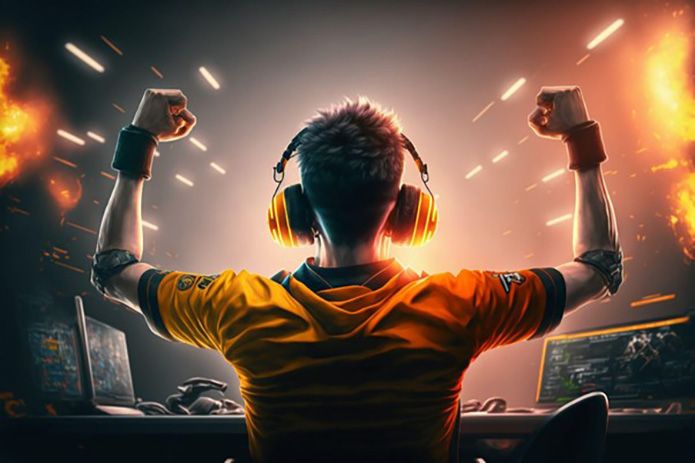Earlier in April, someone purchased a CS: GO AK-47 skin for $400,000. The money was paid for using crypto. In March, a similar skin had been sold for $160,000. Although these skins are so valuable, their owners could lose them if they ever get into trouble with Valve.
Valve is the publisher behind Counter-Strike: Global Offensive, the hugely popular multiplayer first-shooter game. Valve is a centralized company, meaning it has tremendous authority over players.
That being said, players will soon have more power over their in-game assets if Web 3 takes over the world of gaming.
What is Web 3?
Web 3 is a decentralized version of the World Wide Web. In this edition, blockchain will power the web so that no single company has unchecked powers over its customers.
Web 3 will tap on Artificial Intelligence to help users share content, conduct business and interact without requiring the interference of intermediaries. Decision-making will be done with the help of Decentralized Autonomous Organizations (DAO).
DAO members own coins that give them voting rights. And usually, members with a large number of coins hold more powers compared to those with few coins. It’s a controversial concept because it can lead to power concentration. However, it’s a better concept than leaving all the decision-making to one profit-driven entity.
Web 3 in Gaming: Main Benefits
 Web 3 is experiencing rapid adoption in the gaming industry. The explanation is that it’s providing gamers with many moneymaking opportunities. What’s more, it’s enhancing in-game payments and giving players more control over their preferred games.
Web 3 is experiencing rapid adoption in the gaming industry. The explanation is that it’s providing gamers with many moneymaking opportunities. What’s more, it’s enhancing in-game payments and giving players more control over their preferred games.
With the rise of decentralized gaming economies and the integration of blockchain technology, players now have more options and flexibility when it comes to transactions within their favorite games.
In this transformative era, online casinos have also started embracing the advantages of Web3 technology and exploring innovative payment solutions. Jeton e-wallet is used by many casino websites, offering players a seamless and secure payment method. It provides a convenient and efficient way to make transactions on various online platforms, including online casinos.
With that in mind, below is an outline of how Web 3.0 is reshaping video gaming in 2023 and beyond.
Peer-to-Peer Payments
If you want to buy something on most games, you need an intermediary. It could be your credit card company, G Pay or PayPal. Third-party companies charge you a fee to process payments.
They also dictate the transaction time, payment limits, and the games you can buy items from. Web 3 eliminates these issues by facilitating peer-to-peer transactions.
Axie Infinity is an excellent example. This Play to Earn Game comes with AXS coins you can use to buy in-game characters. You don’t need to link your card to buy in-game items. You transact with your favorite game directly.
This increases the payment speed and lowers fees. It’s also convenient now that you don’t need to leave the game to make a transaction.
True Ownership of In-Game Assets
As we mentioned earlier, Web 2 gaming doesn’t provide true ownership to players. Let’s say you love Fortnite and have a ton of skins on the game. Then you outgrow the game and decide to play something different.
You’ll have to give up most of your skins. You can’t transfer them to a friend or sell them directly to someone different. Web 3 solves this problem by ensuring players have total control of their digital assets.
Through blockchain technology, players can transfer their favorite skins to their friends. Or they could sell them without asking for permission from the game. They could also keep their games until when they’re ready to sell them.
True ownership of games could potentially increase the value of skins and NFTs immensely. You see, most players use third-party sites to sell their skins. These sites take commissions for providing the service. With Web 3, players exchange assets without involving a third party.
Empowering Gaming Content Creators
 Games like Minecraft and Fortnite perform so well financially because they allow players to become content creators. They’re not just games you play to complete. They’re games you can play over and over all while exploring new ideas.
Games like Minecraft and Fortnite perform so well financially because they allow players to become content creators. They’re not just games you play to complete. They’re games you can play over and over all while exploring new ideas.
Today you could create the pyramids of Giza on Minecraft. Tomorrow, you could get into a competition to bake a cake with your friends. Now, Minecraft doesn’t exactly pay its content creators. But imagine if it did.
Imagine if you could sell your Minecraft creations. Everyone would be playing the game. Web 3 has been providing ways for content creators to make money while playing games. And so far, the idea has been successful.
Games like Axie Infinity, My Neighbor Alice, and Decentraland attract attention solely because they provide a way to profit from your content. If Web 3 explodes and the majority of games provide players a way to earn money, the gaming industry will become bigger than most traditional industries.
Transparency and Personalization
Earlier on, we mentioned that Web 3 is governed through DAOs. The reason is that autonomous organizations create transparency. The game doesn’t get to hide data or any aspect of a game now that members can vote for this information to be made public.
On the other hand, Web 3-based games are centered on AI. Artificial Intelligence uses Natural Language Processing to create personalized gaming experiences for players.
Personalization makes gaming more fun. And as we all know, games are supposed to be fun. In fact, 93% of people play video games because they’re fun. Up to 89% of players play games to relieve stress.
Interoperability
Interoperability is one of the biggest potential benefits of Web 3. Think about this. You can accumulate skins in one game. Then you could transfer them to a different game and still use them.
Gaming interoperability is presently difficult because most games won’t work together. As we stated earlier, you can’t do anything with your digital assets once you get tired of a game. You just abandon them until you play the game.
Interoperability could allow you to transfer these assets to your new game. And you can use them to complete missions quicker. Or you could sell them.


 by Symphonie
by Symphonie